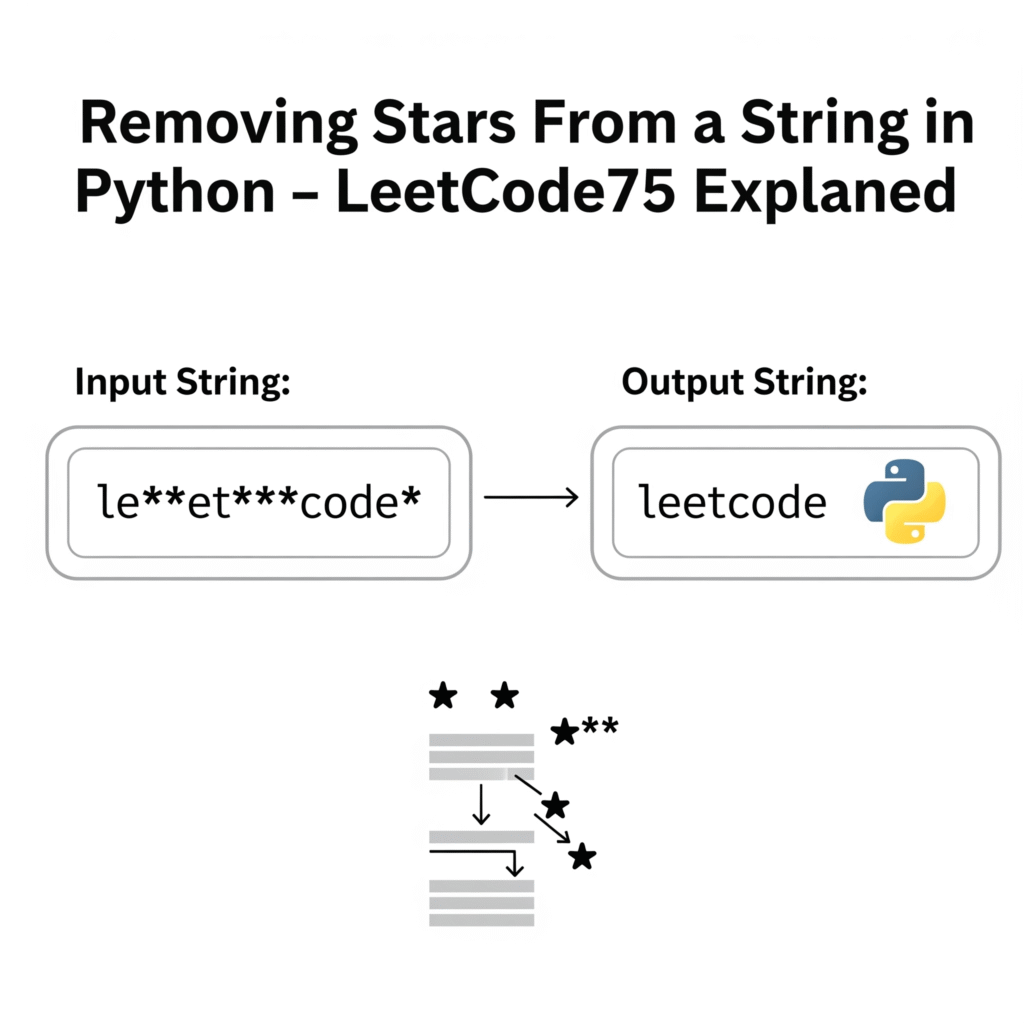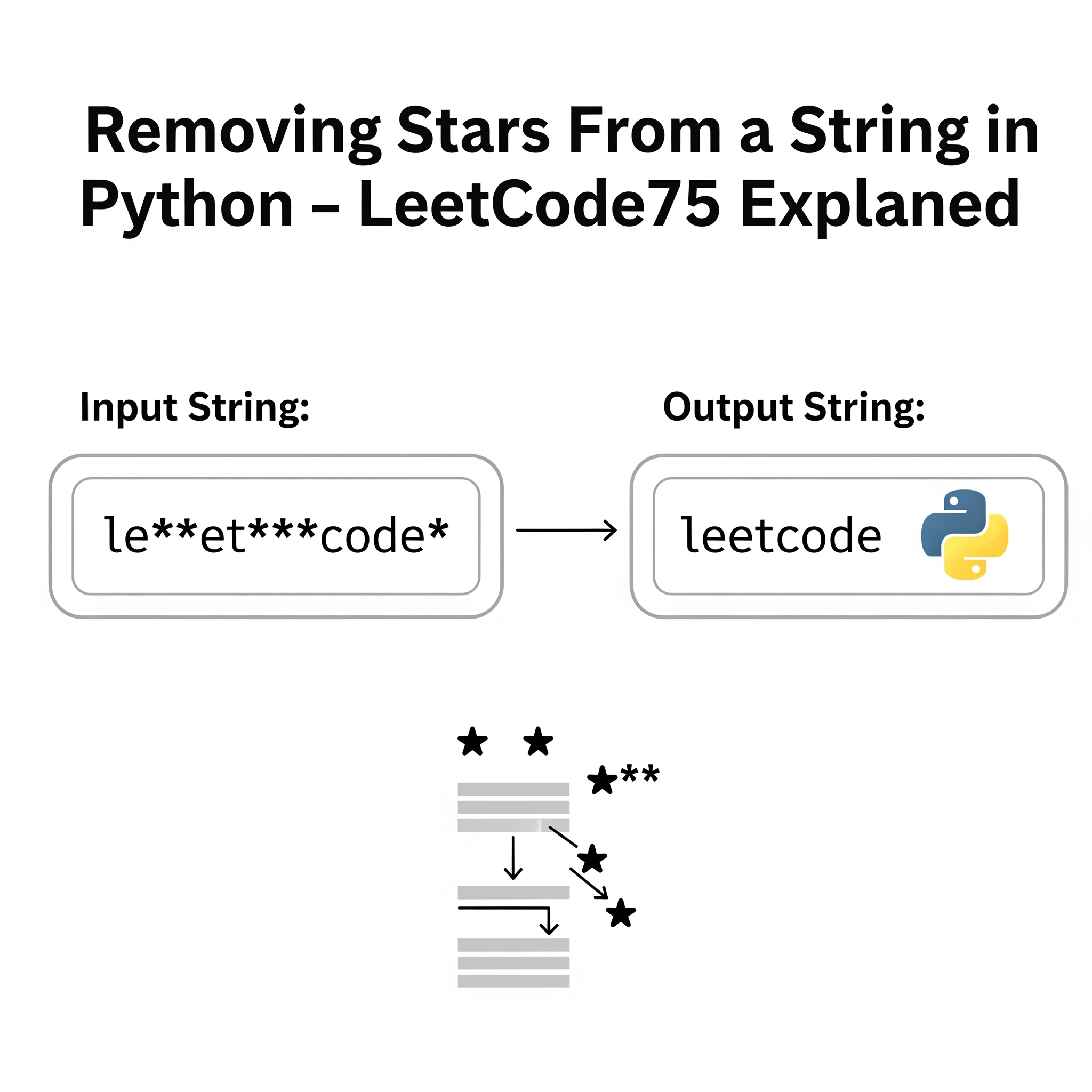The Removing Stars From a String problem from LeetCode75 is a common interview-style string manipulation challenge that tests both logical reasoning and efficient use of data structures. At its core, the problem teaches you how to simulate backspace operations efficiently using a stack, making it an excellent exercise for understanding how Last-In-First-Out (LIFO) structures work in real scenarios.

This blog will walk you through the problem statement, examples, and a complete Python solution with a detailed step-by-step explanation.
Table of Contents
Problem Statement
You are given a string s containing lowercase English letters and the character *.
When you see a *:
- Remove the
*itself. - Remove the closest non-star character to its left.
Return the final string after all operations.
Understanding the Problem
Think of * as a backspace key in a text editor:
- Typing letters → they get added.
- Pressing
*→ deletes the most recent character.
A stack works perfectly here because it follows Last In, First Out (LIFO).
Examples
Example 1
Input: s = "leet**cod*e"
Output: "lecoe"
Example 2
Input: s = "erase*****"
Output: ""
Example 3
Input: s = "ab*c*d"
Output: "d"
Complete Solution
class Solution:
def removeStars(self, s: str) -> str:
# Step 1: Initialize stack
stack = []
# Step 2: Traverse string
for char in s:
if char == '*':
if stack:
stack.pop()
else:
stack.append(char)
# Step 3: Construct result
return ''.join(stack)
Python Solution – Step by Step
Step 1: Initialize a Stack
We need a stack (Python list) to store characters as we process them.
stack = []
Step 2: Traverse the String
For each character in s:
- If it’s a letter → append it to stack.
- If it’s
*→ pop the last character (if any).
for char in s:
if char == '*':
if stack:
stack.pop() # remove last added char
else:
stack.append(char) # store valid char
Step 3: Construct the Result
Join everything left in the stack into the final string.
return ''.join(stack)
Why This Solution Works
- Push to stack = typing a character.
- Pop from stack = pressing backspace (
*). - After processing all characters, the stack contains exactly what remains.
Time and Space Complexity
- Time Complexity: O(n) → one pass through
s. - Space Complexity: O(n) → worst-case stack usage.
Edge Cases
| Input | Output | Explanation |
|---|---|---|
"a*" | "" | a removed by *. |
"***" | "" | Only stars, nothing remains. |
"abc" | "abc" | No stars at all. |
"ab**c" | "c" | Stars delete a and b. |
Real-World Applications
This problem mirrors text editing behavior:
- Backspace in word processors.
- Undo operations in apps.
- Cleaning raw data where
*is a deletion marker.
Conclusion
This problem highlights how stacks can simplify tricky string operations. By treating each * as a backspace, we simulate text editing behavior in a clean and efficient way. The solution runs in linear time, making it practical for large inputs while remaining easy to understand and implement.
More importantly, this problem teaches a structured way to approach string manipulation challenges. By breaking the task into storing characters, applying deletions, and reconstructing the result, we develop a clear problem-solving mindset. This skill is valuable not only for interviews but also for real-world applications like text editors, undo features, and data cleaning workflows.
Related Reads
- Equal Row and Column Pairs in Python – LeetCode75 Explained
- RAG From Scratch: A Complete Guide to Retrieval-Augmented Generation
- Determine if Two Strings Are Close in Python – LeetCode75 Explained
- Unique Number of Occurrences in Python – LeetCode75 Explained
- Find the Difference of Two Arrays in Python – LeetCode 75 Explained
References
LeetCode Problem Page – LeetCode 2390: Removing Stars From a String
GeeksforGeeks – Stack Data Structure – Stack in Python
Real Python – String Manipulation in Python – Python Strings Tutorial


4 thoughts on “Removing Stars From a String in Python – LeetCode75 Clearly Explained”